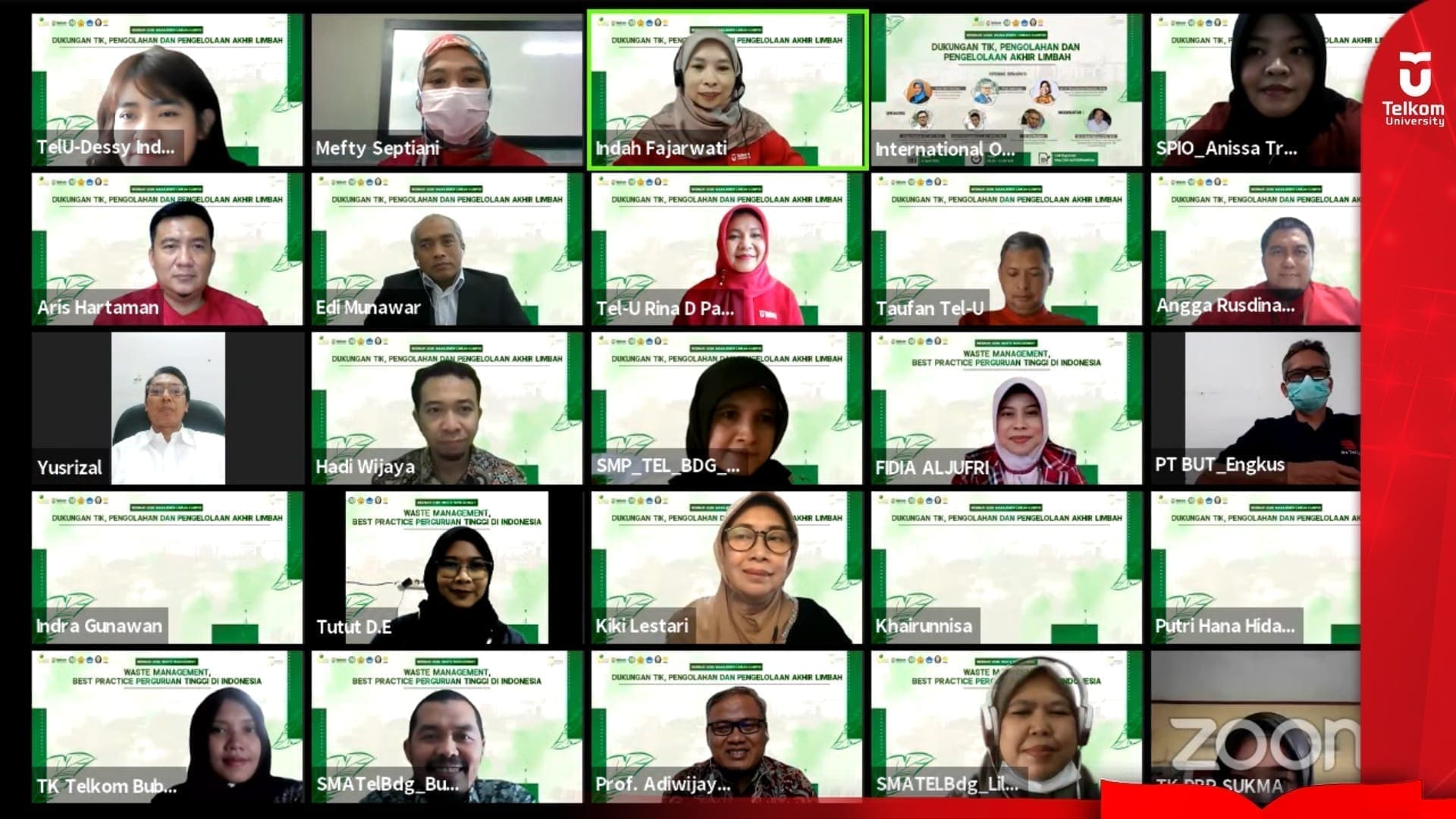
BANDUNG, Telkom University – The biggest problem in the world today that has an impact on the sustainability of the surrounding environment is the problem of waste, water, food waste processing, and waste management.
The webinar was organized by the Campus Waste Solution Team (Solikam) and Telkom University entitled “Campus Waste Management with the Theme of Supporting ICT (Information and Communication Technology), Waste Management and Final Management.” This event is organized online through ZOOM and broadcast on the Telkom University youtube channel, Thursday (8/4).
The Solikam Team is a team formed by UIGM to discuss and produce and provide input for universities and the surrounding community to counter waste management.
It consists of six universities in Indonesia, namely Telkom University (Tel-U), Semarang State University (UNNES), Diponegoro University (UNDIP), Sepuluh Nopember Institute of Technology (ITS), Syiah Kuala University (USK), and Patimura University.
Chairman of the Solikam Team, also Vice-Rector II for Resources at Telkom University, Dr. Rina D Pasaribu conveyed that the formation of this team was not intended to generate new thoughts on the treatment and management of waste on campus and the community.
“Broadly, we hope that with the current collaboration that is not only national but international, we want to work together to make the earth where we live even better for the sustainability of future generations.” He said.
Chairman of UIGM Prof. Riri Fitri Sari said that this event was not only attended by universities that were members of the Solikam team but also all universities, teachers, and students from SMA / K in Indonesia.
“Through this event, we want to spread the spirit of protecting the environment not only for higher education but starting with high school / K students, because from our children in the future we can make our nation better and make a golden generation for Indonesia.” He explained.
Rector of Telkom University Prof. Adiwijaya said that the environment is a shared responsibility, by preserving the environment today will provide a good legacy for future generations.
“Through this event, we can share knowledge not only for the campus where we are currently serving, but more broadly giving the best for the Indonesian people, because it is not enough for one party to make the environment better but through collaboration, so we can provide a comfortable environment for future generations. ” He said.
The webinar was filled with three speakers including Angga Rusdinar., Ph.D. (Director of Research and Community Service, Telkom University), Arseto Yekti Bagastyo., Ph.D. (Head of Solid and B3 Waste Processing, Dept TL, Sepuluh Nopember Institute of Technology), and Dr. Edi Munawar (Assistant Professor of the Department of Chemical Engineering, Syiah Kuala University), and guided by the moderator Dr. A. Netty Siahaya (Research Coordinator for Waste Solutions at UIGM Campus, Patimura University).
Angga, also the UIGM Solikam Team’s Abdimas (Community Service) Coordinator, conveyed what has been implemented at Telkom University in processing and managing waste, and it is hoped that this program can also be implemented in all universities in Indonesia.
As a university with more than 30 thousand students, Telkom University produces quite a lot of waste, Angga explained that previously the waste was sent out and became a burden on the government.
“From this problem we have implemented the I-Want (Integrated Waste Management System) program where currently we have done waste processing on our own on-campus so that waste processing can produce products that can benefit not only the academic community but also the community.” He explained.
As a campus that excels in the field of ICT, Telkom University has produced 2 applications that can be used by the community, Angga explained that currently 2 applications have been used by the community, namely the SMASH application (Online Waste Management System) and Goni-Goni.
“Smash has been connected with more than 11 thousand waste banks and more than 450 thousand customers throughout Indonesia, where this application will help customers in sorting waste to facilitate the processing process, the same as smash, the jute application also has the same function but in this application has an additional function in the form of cultivating worms in dealing with organic waste. ” He explained.
In the I-Want process, Angga added, after the waste at Telkom University was sorted through the SMASH application and jute, the waste was separated, both organic and inorganic, to facilitate the processing process.
“Furthermore, we process the waste into various products, in the form of compost, concrete blocks where the making of these blocks is a mixture of leaf burning ash, making fancy paper and making merchandise from burning plastic in the form of plastic crafts and others.” He said.

